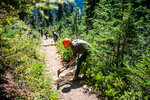
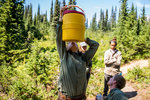
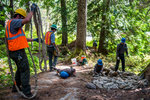
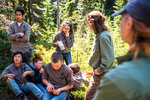
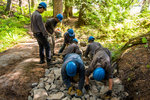
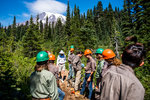
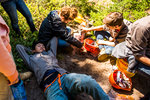
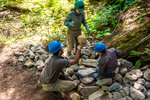
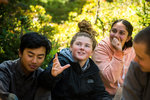
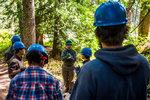
A five-minute hike into Mount Rainier’s Lakes Trail, a group of teenagers is sprawled in the dirt, eating sandwiches and wild huckleberries. They loudly trade jokes and stories, enjoying a lunch break in the mountain sunshine while their digging tools — and an afternoon of work — wait just around the corner.
A few miles away, on the Wonderland Trail, another cluster of workers quietly works rocks into place. This crew has no shortage of its own teenage banter, but it’s communicated in the deft movement of flashing fingers — American Sign Language occasionally punctuated by audible laughter.
Both crews are part of a number of Northwest Youth Corps teams that have been doing work at Mount Rainier National Park all summer. The former is made up of kids from Tacoma who represent a diverse array of backgrounds, the latter of Deaf and Hard of hearing students from all over the country. Another group of LGBTQ youth spent a month working in the park earlier this summer.
The students on Rainier are part of the 1,000 youth and young adults who have served with Northwest Youth Corps this summer in Washington, Oregon and Idaho, and they reflect its increasing focus on bringing diversity to conservation and the outdoors. Jay Satz, the Corps’ senior director of partnerships and innovation, said the organization has gone from being passively inclusive to actively seeking out ways to bring new communities into its work.
“We were just excited to welcome everybody without extra intention or work or recognition,” he said. “That changed 10 years ago. The more experience we had with kids in our programs that were bringing this diversity, the more we realized we needed to be humble.”
The diversity issue is one the National Park Service has been grappling with for some time, and Rainier trail foreman Jim Ziolkowski thinks the Youth Corps crews are an example of how that change can happen.
“Change is slow, but I can bring in a Youth Corps group that represents everything we’re trying to become,” he said. “It’s a start. With that start there’s experience that’s gained, and that experience can show up on a resume and hopefully eventually become part of our staff here.”
The program isn’t just about giving new communities a chance to ooh and ahh at a mountain. It’s hard work, and most of the kids working on a late-August Wednesday said it was their first summer job.
“Most kids don’t get an opportunity like this,” said Zander, who was working with the Sound to Summit crew from Tacoma. “Most kids spend their summer hanging out and playing video games.”
Northwest Youth Corps does not allow minors to be identified by their last names.
An assistant crew leader for the American Sign Language group, who asked to be identified as P.S., noted what the work means for the kids in that crew.
“The deaf population, as far as I’m concerned, they need this,” he said. “They need to see the power of potential and their own empowerment. This work, it’s tough, it’s hot, it’s sweaty, it’s dirty. You have to cook for yourself, you have to make camp, you have to clean up after yourself. You have to learn responsibility and accountability. In my experience, this group, they pick it up. It’s very natural. They’re just used to fighting a little bit more.”
Brod Salo, a co-leader of the LGBTQ crew, said in a phone interview that spending extended time in nature offered value along with the work experience.
“Being outdoors has always helped me to feel more centered and grounded and see myself reflected in the natural world,” they said. “Things are not so binary and so linear. … It’s definitely that release from this pressure of having to be a certain way or having to bend and shift and be super fluid to what everyone else wants. When I was out there with the LGBTQ youth crew, we were able to be exactly as we are.”
That ease was clear on the Lakes Trail, past gravel and drainage packed and dug by the Sound to Summit students. The kids made cracks about who was the worst cook, claimed to not miss cell phone reception and laughed about camping in the rain and hauling heavy loads up the trail.
“Over half of my sleeping bag was wet,” Kalinda said. “It was cold. But it was all good in the end, because it got sunny the day after. Working here, I appreciate those small details a lot more.”
Ksenia, a student with the ASL team, said she had gained a lot over the summer.
“I’ve been learning skills like teamwork, how to communicate with all kinds of people, using new tools that I haven’t used before, haven’t seen before,” she said.
She noted that much like oral speech, sign language can have regional dialects, and she was picking up new things from what she’d grown up with in Maryland.
Elijah, a fellow ASL student, said working with the group had helped his ability to relate to other people, as well as his trail skills.
“People show their emotions with their face, their body language,” he said. “I’ve learned how I can match that mood with the different members of my team and that really just helps our partnership as a whole. … I need empathy, I need compassion — working on trying to match communication style, match personalities with a new person.”
The wild setting of their work has been key to that bonding, said Kiara Suarez, ASL crew leader.
“Our society is so focused on technology that it’s nice to be able to disconnect,” she said. “If you want to talk to someone, you talk to them face to face. People don’t do that anymore.”
Northwest Youth Corps teams generally work as five-week programs, offering an educational stipend and school credit. The Sound to Summit team spent four weeks working on parks in Tacoma before capping their summer with a week at Rainier. The LGBTQ team spent its final week kayaking in the San Juan Islands after a month in the national park. Both the ASL and Sound to Summit teams were the second teams in their programs to work in the park this summer.
The program isn’t just a benefit for the kids who participate. The National Park Service has a multi-billion dollar maintenance backlog, and Mount Rainier is no exception.
“We have 275 miles of trail. We are not able to work on every mile of the trail,” Ziolkowski said. “I’ve seen a lot of good work. I’ve seen a lot of great attitudes. I’ve seen a love for the park. It’s everything you would want in someone who’s here doing work.”
That respect is mutual, said Dani Mae Hutson, a crew leader with the Sound to Summit group.
“I think (the students) are appreciating how hard it can be and how hard people actually work,” she said. “They didn’t realize before this job how much work goes into keeping a park and the natural areas that we do have.”
Of course, along with learning how to dig in the dirt and haul rocks, the students have enjoyed the up-close time in nature, many of them for the first time. The Tacoma students described spending several foggy days in the park, then watching the sky eventually clear to reveal Rainier in all its glory above Reflection Lakes.
“The mountain looks really beautiful,” Malachi said. “In Tacoma, it’s kind of distant.”
That firsthand experience, Satz said, is why Northwest Youth Corps is so crucial. As America becomes increasingly urbanized, it’s important for them to understand the world beyond their cities.
“There’s all sorts of issues about the value of hunting or understanding where food comes from or farming or the value of watersheds,” he said. We’re trying to make relevant the experience outside their cities. … (Without that), it becomes an intellectual exercise instead of a deeply felt internal understanding.”
As the ASL crew loaded up their equipment at the end of the day, NPS trail crew leader James Montgomery spoke highly of their efforts.
“The work is hard, it’s physically demanding,” he said. “You come home at the end of every day and your body just hurts. Also, at the end of every day we get to look down at the work we did, and there’s a lot of satisfaction in that too. It’s neat to pass on that you can work really hard and be really tired and be really satisfied. … Nature is the great equalizer. It doesn’t care how wealthy you are or how old you are or what color your skin is or what your sexual orientation is. It doesn’t care about any of that stuff.”